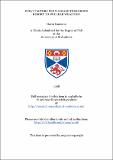Files in this item
What factors would make terrorists resort to nuclear weapons?
Item metadata
| dc.contributor.advisor | Hoffman, Bruce | |
| dc.contributor.author | Cameron, Gavin | |
| dc.coverage.spatial | 296 p. | en_US |
| dc.date.accessioned | 2018-07-10T10:21:29Z | |
| dc.date.available | 2018-07-10T10:21:29Z | |
| dc.date.issued | 1998 | |
| dc.identifier.uri | https://hdl.handle.net/10023/15166 | |
| dc.description.abstract | This thesis considers the factors that affect the escalation of terrorist violence. Terrorists often have an emotional and psychological stake in preserving the identity, the character, and, above all, the existence of their group. This has the effect of subverting ends to means: the ideology and goals of the group become secondary in importance to the necessities of organisational survival. At the same time, terrorism is generally a highly inefficient means of achieving strategic political objectives. Confronted by the failure of their campaign and unable to move from violence, since that would endanger the group's survival, terrorists may conclude that their best option is to increase the level of violence that they employ. In the past, self-imposed restraints and the fear of a backlash have often prevented terrorists from resorting to highly lethal acts of violence. However, recently these dynamics have been combined with "non-traditional" terrorism that finds greater levels of violence not only acceptable, but necessary. Such terrorism has encompassed a range of motivations, but much of it reflects a growing dependence on religion, often combined with other factors, as legitimation. Undoubtedly, such groups aspire to higher levels of violence than has been the case with other, more traditional terrorist organisations. Consequently, they may be more willing to regard mass terrorism as justifiable. These factors are considered in the context of the increased opportunities for nuclear proliferation, arising from the collapse of the former Soviet Union, and the increased feasibility of biological or chemical terrorism. The thesis concludes by arguing that, whereas non-conventional terrorism was once a remote threat, the changing nature of terrorism, combined with its intrinsic escalatory and self-perpetuating nature, means that the threat of nuclear terrorism has never been greater than it is now. | en_US |
| dc.language.iso | en | en_US |
| dc.publisher | University of St Andrews | |
| dc.subject.lcc | HV6431.N9C2 | |
| dc.subject.lcsh | Terrorism | en |
| dc.title | What factors would make terrorists resort to nuclear weapons? | en_US |
| dc.type | Thesis | en_US |
| dc.contributor.sponsor | University of St Andrews | en_US |
| dc.type.qualificationlevel | Doctoral | en_US |
| dc.type.qualificationname | PhD Doctor of Philosophy | en_US |
| dc.publisher.institution | The University of St Andrews | en_US |
This item appears in the following Collection(s)
Items in the St Andrews Research Repository are protected by copyright, with all rights reserved, unless otherwise indicated.

